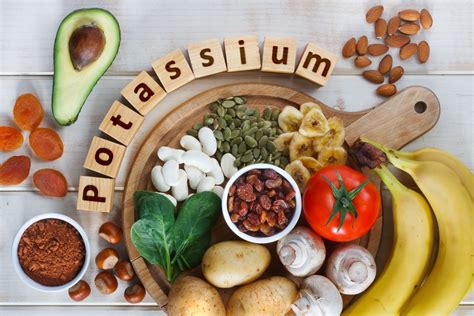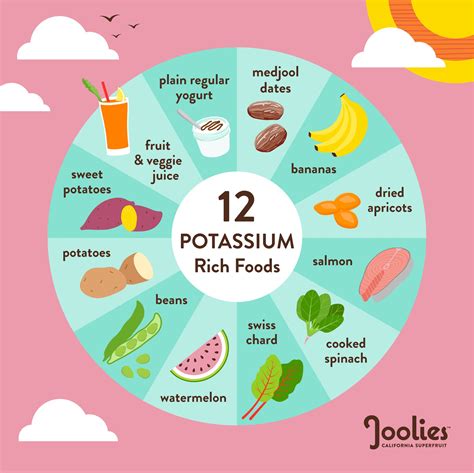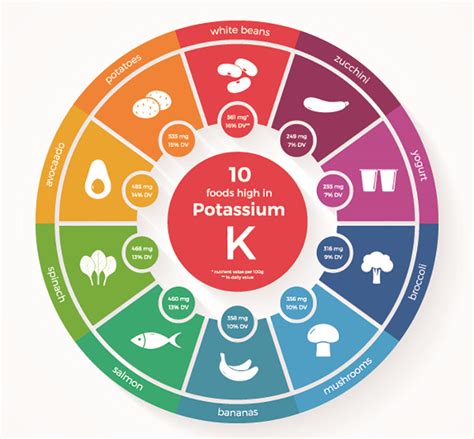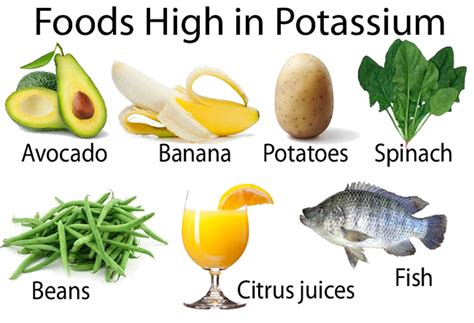Intro
Potassium is an essential mineral that plays a crucial role in maintaining various bodily functions, including heart health, blood pressure regulation, and muscle function. Despite its importance, many individuals fail to consume sufficient amounts of potassium-rich foods, leading to potential health complications. In this article, we will delve into the importance of potassium, its benefits, and explore the various potassium-rich food sources that can help individuals meet their daily requirements.
A diet rich in potassium can have numerous health benefits, including reducing the risk of heart disease, stroke, and kidney stones. Potassium helps to lower blood pressure by balancing out the effects of sodium in the body, which can help to reduce the strain on the cardiovascular system. Furthermore, potassium is essential for maintaining healthy muscle and nerve function, making it an essential mineral for individuals who engage in regular physical activity. With the average person requiring around 4,700 milligrams of potassium per day, it is essential to incorporate potassium-rich foods into your diet to reap the numerous health benefits.
Incorporating potassium-rich foods into your diet can be easier than you think. There are numerous delicious and nutritious food options that are rich in potassium, making it simple to meet your daily requirements. From fruits and vegetables to whole grains and lean proteins, there are plenty of ways to boost your potassium intake. Whether you are looking to improve your overall health or manage a specific health condition, understanding the importance of potassium and incorporating potassium-rich foods into your diet can have a significant impact on your well-being.
Potassium Benefits

- Reducing blood pressure: Potassium helps to lower blood pressure by balancing out the effects of sodium in the body.
- Promoting bone health: Potassium helps to regulate calcium levels in the body, which can help to promote bone health and reduce the risk of osteoporosis.
- Supporting muscle function: Potassium is essential for maintaining healthy muscle function, making it an essential mineral for individuals who engage in regular physical activity.
- Reducing the risk of kidney stones: Potassium can help to reduce the risk of kidney stones by increasing urine production and helping to remove excess calcium from the body.
Potassium Deficiency
A potassium deficiency can occur when the body does not have enough potassium to function properly. This can be caused by a variety of factors, including a poor diet, certain medications, and underlying medical conditions. Some of the common symptoms of a potassium deficiency include:- Fatigue and weakness
- Muscle cramps and spasms
- Abnormal heart rhythms
- Constipation
Potassium Rich Food Sources

- Leafy greens: Spinach, kale, and collard greens are all rich in potassium.
- Fruits: Bananas, avocados, and apricots are all good sources of potassium.
- Legumes: White beans, lentils, and chickpeas are all rich in potassium.
- Nuts and seeds: Almonds, pumpkin seeds, and sunflower seeds are all good sources of potassium.
- Whole grains: Brown rice, quinoa, and whole wheat bread are all rich in potassium.
Top 10 Potassium Rich Foods
Here are the top 10 potassium-rich foods that can help individuals meet their daily requirements:- Spinach: 1 cup cooked = 840 milligrams
- Sweet potatoes: 1 medium = 542 milligrams
- Avocados: 1 medium = 708 milligrams
- Bananas: 1 medium = 422 milligrams
- Almonds: 1 ounce = 718 milligrams
- Leafy greens: 1 cup cooked = 840 milligrams
- White beans: 1 cup cooked = 1,189 milligrams
- Lentils: 1 cup cooked = 731 milligrams
- Salmon: 3 ounces = 534 milligrams
- Yogurt: 1 cup = 579 milligrams
Increasing Potassium Intake

- Eat a variety of fruits and vegetables: Aim for at least 5 servings a day to help meet your potassium requirements.
- Incorporate leafy greens into your meals: Add spinach, kale, or collard greens to your salads, smoothies, or sautéed dishes.
- Snack on nuts and seeds: Almonds, pumpkin seeds, and sunflower seeds are all good sources of potassium.
- Choose whole grains: Brown rice, quinoa, and whole wheat bread are all rich in potassium.
- Limit processed foods: Processed foods are often low in potassium and high in sodium, which can have negative effects on blood pressure.
Potassium Supplements
While it is always best to get your nutrients through food sources, potassium supplements can be beneficial for individuals who are unable to meet their daily requirements through diet alone. However, it is essential to consult with a healthcare professional before taking any supplements to ensure that you are getting the right amount and to avoid any potential interactions with medications.Potassium and Health Conditions

- High blood pressure: Potassium can help to lower blood pressure by balancing out the effects of sodium in the body.
- Kidney disease: Potassium can help to reduce the risk of kidney disease by increasing urine production and helping to remove excess calcium from the body.
- Osteoporosis: Potassium can help to promote bone health by regulating calcium levels in the body.
- Muscle disorders: Potassium is essential for maintaining healthy muscle function, making it an essential mineral for individuals with muscle disorders.
Potassium and Medications
Certain medications can interact with potassium, including:- Diuretics: These medications can increase potassium loss in the urine, leading to a deficiency.
- Blood thinners: These medications can increase the risk of bleeding when taken with potassium supplements.
- Beta-blockers: These medications can increase potassium levels in the body, leading to an imbalance.
Potassium and Pregnancy

- Reducing the risk of preeclampsia: Potassium can help to lower blood pressure and reduce the risk of preeclampsia.
- Promoting fetal development: Potassium is essential for fetal development, particularly in the development of the nervous system.
- Supporting overall health: Potassium can help to support overall health during pregnancy, reducing the risk of complications and promoting a healthy birth.
Potassium and Breastfeeding
Potassium is also essential for breastfeeding women, as it helps to support milk production and overall health. Some of the key benefits of potassium during breastfeeding include:- Supporting milk production: Potassium can help to support milk production, ensuring that the baby is getting the nutrients they need.
- Promoting overall health: Potassium can help to support overall health during breastfeeding, reducing the risk of complications and promoting a healthy recovery from childbirth.
What are the symptoms of a potassium deficiency?
+A potassium deficiency can cause a range of symptoms, including fatigue, weakness, muscle cramps, and abnormal heart rhythms.
How can I increase my potassium intake?
+Increase your potassium intake by eating a variety of fruits and vegetables, incorporating leafy greens into your meals, snacking on nuts and seeds, choosing whole grains, and limiting processed foods.
Can I take potassium supplements?
+While it is always best to get your nutrients through food sources, potassium supplements can be beneficial for individuals who are unable to meet their daily requirements through diet alone. However, it is essential to consult with a healthcare professional before taking any supplements.
In conclusion, potassium is an essential mineral that plays a crucial role in maintaining various bodily functions. Incorporating potassium-rich foods into your diet can have numerous health benefits, including reducing the risk of heart disease, stroke, and kidney stones. By understanding the importance of potassium and taking steps to increase your intake, you can promote overall health and well-being. We encourage you to share this article with others, and to comment below with any questions or feedback you may have. Additionally, if you are looking to learn more about potassium and its benefits, we invite you to explore our other resources and articles on the topic.
